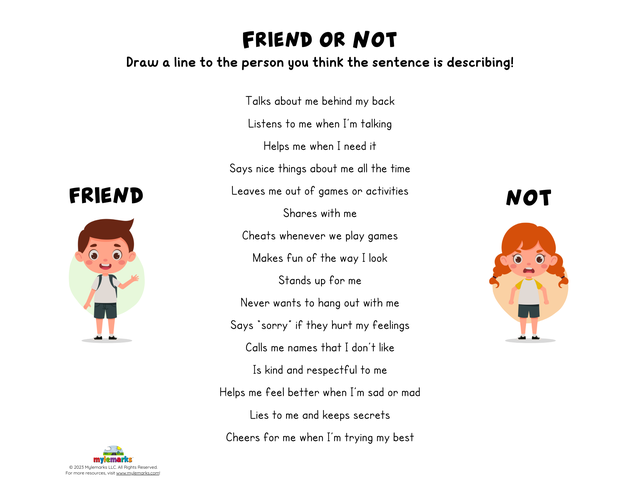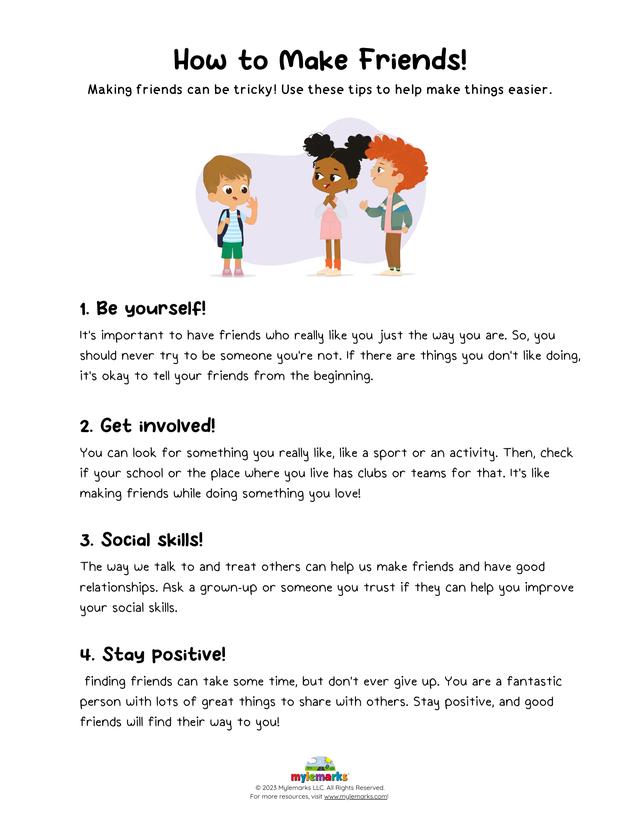- the mylemarker
- Posts
- 📝 Marshmallow test, a freebie, and more
📝 Marshmallow test, a freebie, and more
Your ultimate source for captivating Mylemarks resources and the latest updates in kids' mental health and social-emotional wellness!
THE ROAD MAP
In this newsletter, you’ll find:
🚦 First stop (Rethinking the Marshmallow Test)
🛤️ Site-seeing at mylemarks.com (A freebie)
📡 On the Radar (Banned dyes, soiling the nest, and more)
📣 A Word from BetterHelp
📊 Results are in (Poll results from the last edition)
✍🏽 U(r)-Turn (Let’s hear from you)
🤗 Sharing is Caring (spread the mylemarker love and earn)
Let’s go!

FIRST STOP
📝 Rethinking the Marshmallow Test

Researchers are beginning to question how we measure executive function, a set of cognitive skills that help individuals focus, think flexibly, and achieve goals. These abilities develop in childhood and are critical across various contexts. The importance of executive function has been tied to school success, but disparities—often framed as deficits—have been linked to factors such as poverty, chaotic home environments, and minority status.
Recent studies, such as Yuko Munakata’s research on the Marshmallow Test, further highlight the influence of cultural context on executive function. For example, Japanese children were better at waiting for food but not gifts, while American children showed the reverse pattern. These findings suggest that executive function skills may not be as fixed as previously thought, but highly context-dependent.
"I did not recognize the bias built into the test until I sat in the room with the kids. As soon as I asked them to do them, it became obvious what was wrong."
Researchers are exploring solutions, such as designing tests more grounded in real-world tasks. For instance, children might be asked to match nuts and bolts while managing other simultaneous tasks, reflecting more everyday cognitive challenges. As Sabine Doebel from George Mason University explains, recognizing cultural biases in executive function tests is essential, especially for those in the dominant culture who may not see their own assumptions.
✨ RELATED RESOURCE: Executive Functioning Resources
SITE-SEEING at mylemarks.com
Freebie: Friendship Jar
As kids return to school, they encounter new classmates and teachers alongside familiar faces. This is an excellent opportunity to practice making new friends through social skills and acts of kindness. The Friendship Jar worksheet provides children with simple, friendly suggestions for how they can connect with peers both in and out of school, encouraging them to complete these actions as they work toward filling up their jar.

Free Until September 17, 2024
✨ Other Friendship-Building Resources You Might Enjoy From the Friendships and Relationships Category
📣 A Word from BetterHelp
Manage Stress with Expert Support – Start Therapy with BetterHelp
Feel like you’re spinning your wheels, juggling endless responsibilities? Work, school, relationships—everything adds up. BetterHelp makes finding the right therapist fast and easy with a 5-minute quiz that matches you with one of 32,000 licensed professionals. Connect with your therapist through phone, video, or text, so therapy fits your life. You can even use FSA or HSA dollars toward therapy. Join the 4 million people already finding support with BetterHelp. Sign up today and enjoy 30% off your first three months—reclaim your peace of mind in just 48 hours.
ON THE RADAR
⚠️ US Surgeon General Warns of Toxic Stress Levels Among Parents
The US Surgeon General, Dr. Vivek Murthy, has issued a warning that parenting can be hazardous to one's mental health due to extreme stress levels. According to the advisory, 41% of parents report being too stressed to function most days, and 48% feel completely overwhelmed. The Surgeon General attributes this stress to modern challenges such as social media, the youth mental health crisis, and the "epidemic of loneliness." Murthy argues that policy changes and community programs are necessary to support parents, including affordable childcare, mental health resources, and time off from work to care for a sick child. He also calls for a shift in cultural norms to value and support parents, recognizing that raising children is "sacred work" that requires openness and understanding.
💡 Parents' stress often affects the entire family. Check-in with parents about their stress levels and encourage them to prioritize self-care and to seek support when needed to improve family dynamics.
—
❌ California Bans Certain Dyes Linked to Behavioral Issues

Photo by SDI Productions
California has become the first state to ban certain artificial food dyes from being used in school meals. The ban, which goes into effect in 2025, targets five synthetic dyes that have been linked to potential health risks, including hyperactivity and cancer. The dyes, which are commonly used in foods such as fruit snacks, candy, and baked goods, will no longer be allowed in school cafeterias. The move is part of a broader effort to promote healthier eating habits and reduce the risk of chronic diseases among children. Proponents of the ban argue that artificial food dyes have no nutritional value and can have negative impacts on children's health. The California Department of Education will work with schools to implement the ban and find alternative, natural food coloring options.
—
🏚️ ‘Soiling the Nest’
As teenagers prepare to leave the nest and start college, they may exhibit a sudden behavior change, becoming more difficult and defiant at home. This phenomenon, known as "soiling the nest," is a normal phase of growing up, according to clinical psychologist Regine Galanti. It's a way for teens to assert their independence and create space between themselves and their parents, making the transition to adulthood easier. Parents should expect this behavior and not take it personally, recognizing that it's a natural part of their child's development.
"Recognize that, as a parent, this is not about you. This is about your child having difficulty figuring out how they're going to manage the next phase of their lives. Pushing you away might make it easier for teens to launch themselves into independence."
Experts advise parents to give their teens space and independence while still maintaining boundaries and offering guidance.
—
🙄 The Decline of Eye Contact
Educators and experts are noticing a decline in eye contact among children, with many struggling to maintain eye contact during conversations. This trend is attributed to the increasing amount of time kids spend interacting with screens, which can hinder their ability to develop essential social skills. Reduced eye contact can lead to difficulties in building relationships, empathizing with others, and even securing jobs in the future. The overuse of digital devices is rewiring children's brains, making it harder for them to engage in face-to-face interactions. Furthermore, the pandemic has exacerbated this issue, as kids have spent more time isolated and interacting with screens. To combat this trend, educators and parents can encourage activities that promote face-to-face interaction, such as group projects, role-playing, and device-free conversations.
💡 Role-playing and using resources to teach social cues are key to teaching skills such as eye contact. Focus on activities that promote face-to-face interactions to help them understand the importance of connecting in real life.
—
😰 The Link Between Overprotective Parenting and Childhood Anxiety
Research suggests that overprotective parenting may be contributing to the growing number of children experiencing anxiety. When parents are overly cautious and restrictive, they may inadvertently send the message that the world is a scary and unpredictable place. This can lead to children feeling anxious and uncertain about their ability to navigate challenges. As a result, children may develop a lack of confidence and resilience, making them more vulnerable to anxiety. By giving children more autonomy and allowing them to take calculated risks, parents can help them develop the skills and confidence they need to manage anxiety and thrive.
RESULTS ARE IN
In the last edition of the mylemarker, we asked, What strategies have been most effective in your work with clients struggling with school absenteeism or refusal? from our feature article from PopSugar. See the results and a few responses below!

“The cases of school absenteeism that I see are usually related to situations happening in the home with the family, so it’s important for me to get them involved in treatment. Some families are just experiencing lack of resources to be able to get their kids to school every day.”
“Offer alternative learning environments in school with different instructors and according to the child's cognitive level.”
“Parents. it’s usually always the parents. Most of my interventions involve teaching the parents things they can do in the home.”
“As we get closer to the school year, I always like to check in my the kids I work with about how they are really feeling about going back to school. I use a feelings chart and have them choose 2 or 3 different feelings they’re experiencing about going back to school. The first feeling is them usually telling me what I want to hear. The last feeling is the one that usually shows how they’re REALLY feeling. I do this with other life situations and it works well.”
U(R)-TURN
We’d love to hear from you! Help guide future products by answering the question below. Or if you have something nice to say about us, consider leaving a testimonial!
my sister, since we’re at a 10-hour time difference now, which means that she lives “in the future”
— “paula” (@paularambles)
9:08 PM • Sep 2, 2024
Worksheets | Activities | Workbooks | Journals | Games | Videos | Freebies





